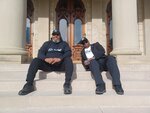

In 1980, a 17-year-old U.S. Army recruit named Robert Shearon was shipped off from Detroit to serve in South Korea.
He spent the next two years overseas, but the lasting troubles began when he came back.
“I joined right out of high school, and I never drank before I left. In any event, when I came home in 1982, I was a full-blown alcoholic and drug addict. I found myself walking around on my own, with no assistance or help. I don’t know how, but I was able to manage like this for years,” Shearon explained.
In 1998, addicted and with a then-undiagnosed case of PTSD, Shearon entered the Michigan prison system for the first time on a felony weapon charge. After his release in 2006, Shearon stayed out for two years before earning another sentence for armed robbery in 2008.
When he got out in 2018, Shearon moved into a Haslett townhome with his wife, Renee, a “childhood sweetheart” with whom he’d reconnected while serving his second sentence. Despite the blessing of his parole officer, Shearon’s criminal record posed a problem when it came time to renew Renee’s existing lease.
“When we looked at the lease, it talked about felony convictions and the fact that, if you have one, you’re not even eligible to be on the property,” Shearon said. “I had to sneak around and avoid the manager and the maintenance people for a year and a half just to be on a property that I should have been rightfully able to be on, because I was splitting rent.”
Members of the Michigan Legislature have taken notice of the issue. Last June, Rep. Abraham Aiyash, D-Detroit, introduced Michigan Fair Chance to Housing Act. House Bill No. 4878 would prohibit landlords from using an applicant’s criminal record to deny them housing, aside from specific cases involving sex offenders and arsonists.
Last week, the Lansing City Council passed a resolution calling for the bill’s passage just a week after Gov. Gretchen Whitmer designated April as “Fair Housing Month” in Michigan.
State Rep. Emily Dievendorf, D-Lansing, was one of 14 who spoke for the legislation before the Council, citing it as “an integral part of that larger, broader package to ensure housing accessibility for all of our residents.”
“Regardless of mistakes in the past, regardless of efforts toward rehabilitation, we want to make sure that rehabilitation and corrections actually means what it says,” Dievendorf said.
If passed, the bill would help those who find themselves in a similar situation to Shearon’s. Introduced last year, it is still in committee.
“My case is not unique. I was just self-medicating and trying to feed my drug and alcohol problem because I wasn’t getting the help anywhere else, and that led to my convictions,” Shearon said. “There are a lot of veterans and formerly incarcerated people who are going through the same thing right now, as we speak.”
Shearon, 61, became active with Nation Outside, a statewide organization founded in 2014 to advocate for the formerly incarcerated. Through his involvement, he met Tony Gant, another formerly incarcerated Michigander who was named the group’s co-executive director in January.
Gant, 51, served 20 years in prison until 2015.
“When I got out, I was pretty optimistic at least that I would be able to get a second chance, get a pretty good job and all those things that came along with rebuilding one’s life after incarceration. What I learned fairly quickly was that there are some pretty difficult barriers in place for people with criminal records,” Gant said.
Gant said passing the fair chance housing bill would be key to minimizing what he called a “cascading effect of collateral consequences and perpetual punishment.”
“We may be mad at the individual for whatever crime they committed, but by punishing them after their release, we also harm the family that that person is tied to,” he explained, citing his 7-year-old son as an example.
“The reason experts say he’s more likely to be incarcerated himself is not because he’s bad, but because they factor in the type of barriers I’m going to face the rest of my life and how those affect him. That’s how, anecdotally, you can see generations of families tied up in the criminal legal system,” Gant said.
One of Gant’s allies in advocacy is Trisha Washburn, who signed on as Nation Outside’s Lansing engagement specialist in November. Before moving to Lansing in 2020, she said she was “struck” by the barriers former offenders faced in housing through her work with the Northwest Michigan Community Action Agency in Petoskey.
“I worked to help get them into housing, and it was just atrocious to see how landlords would deny them right off the bat, even for things that were 20 years ago,” Washburn said.
“It almost felt like housing was only for the best of the best,” she added. “If their credit wasn’t perfect, if they had unstable housing or employment history or past evictions, the landlord would get really sketched out about housing them.”
Washburn noted that most of her formerly incarcerated clients stayed on the straight and narrow.
“Even when they were sleeping on benches, they still didn’t commit any crimes because they were just over it. They had grown up, and they just weren’t the kids they used to be,” she said. “I get that not everybody will change, but, in general, people do age out of crime.”
Rita Dunlop, an apartment manager with SJ Commercial Properties, which does business locally, echoed these observations at the Council meeting.
“I have had many successful ex-offenders. Some of them have turned out to be some of my best tenants and are still there,” Dunlop said. “Many of them are so grateful and thankful. It isn’t just about renting to them; it’s about welcoming them in your rental community and having other tenants feel the same.”
Shearon said finding permanent housing was a primary reason he was able to find his footing after spending nearly 19 years behind bars.
“If we house them and give them employment, guess what? They’re not going to break into your car, your garage or your home. Otherwise, people are going to find a way to survive,” Shearon said.
Shearon finally escaped the cycle himself in February 2020, when he and his wife secured a mortgage on a home in Haslett through a VA loan.
It was an achievement Shearon never thought he’d reach.
“For so long, I thought I was just dealing with life. I thought I was just a screwed-up individual until 2018, when my wife had mental health therapists in place for me when I was released. They diagnosed me with PTSD. I had never heard that term before,” Shearon said.
“That saved my life, because from that day forward, there are no blemishes,” he added. “I’m now a homeowner, I’m financially secure, and I’ve gained a wealth of knowledge and information from my experiences.”
While his post-traumatic stress disorder may never subside, Shearon has found a renewed sense of purpose through his work with Nation Outside. By telling his own story, he hopes to encourage legislators to support the fair chance bill, while also inspiring other formerly incarcerated Michiganders to get the help they need.
“These people were making 30 cents a day in prison. So, when they finally have a job where they’re making $15 to $30 an hour, and a place to stay, they’re not trying to lose that,” he said. “If they’ve got the credit score, income and no present criminal activity, why not give them a chance to have a place to live?”
— TYLER SCHNEIDER
Support City Pulse - Donate Today!
Comments
No comments on this item Please log in to comment by clicking here